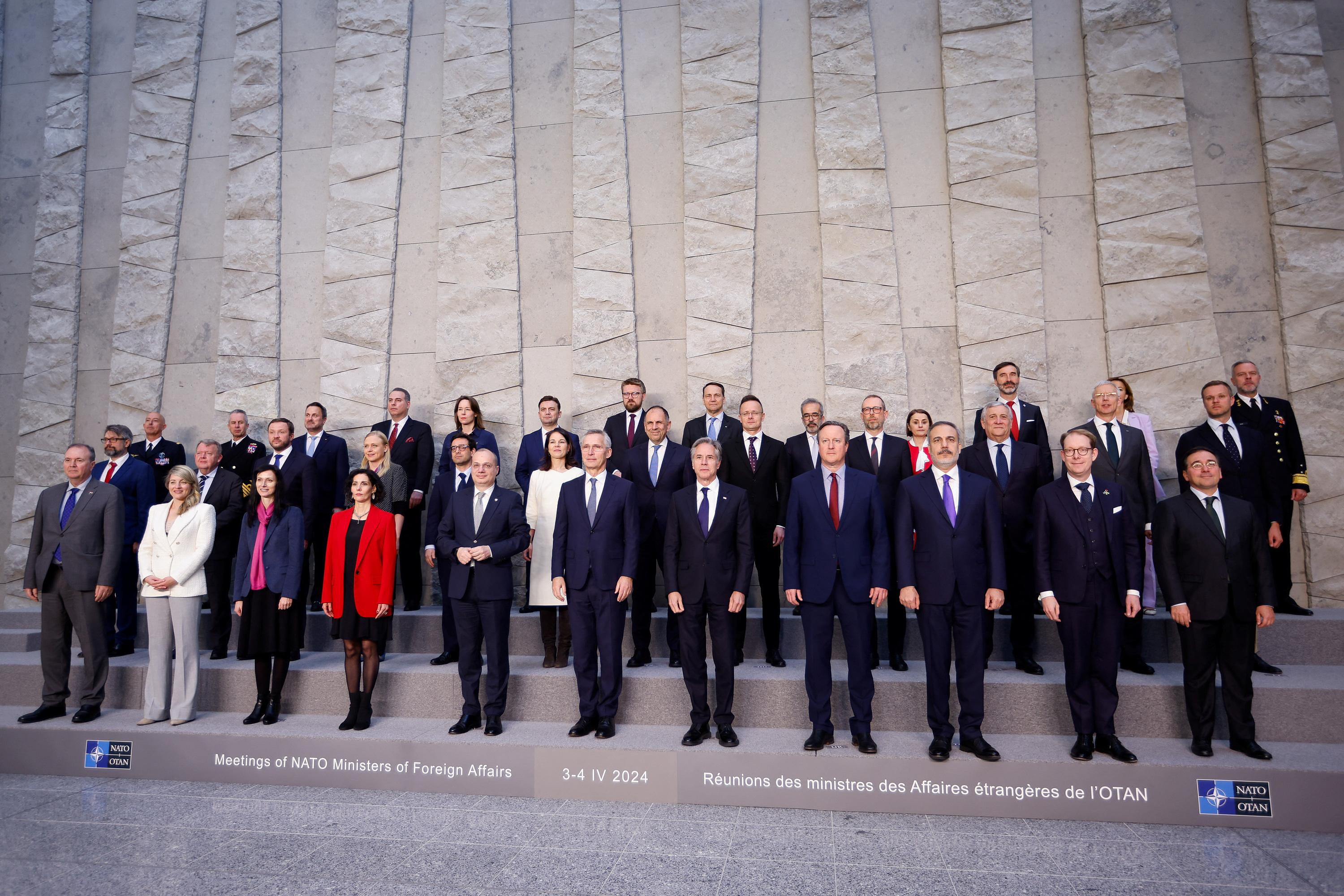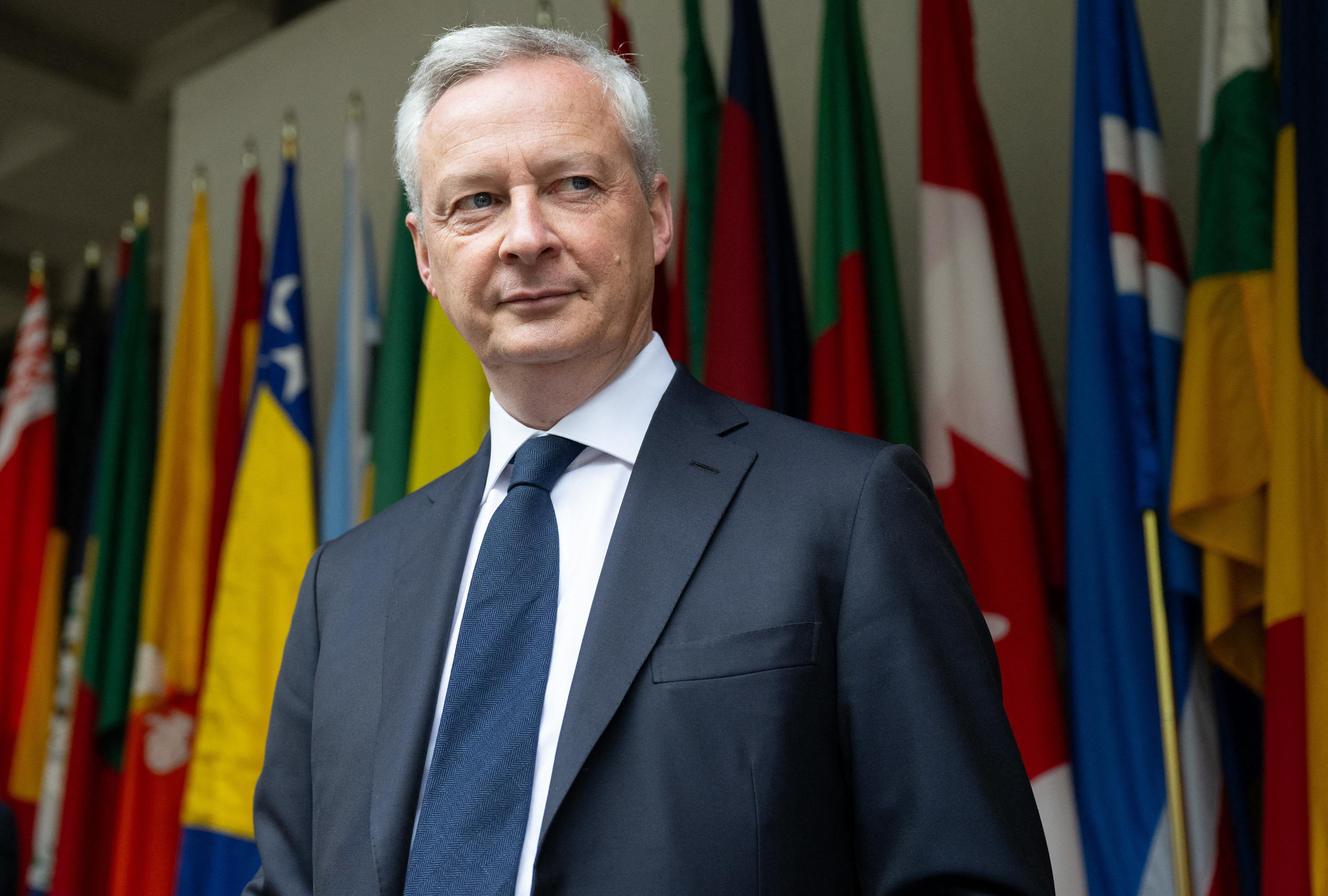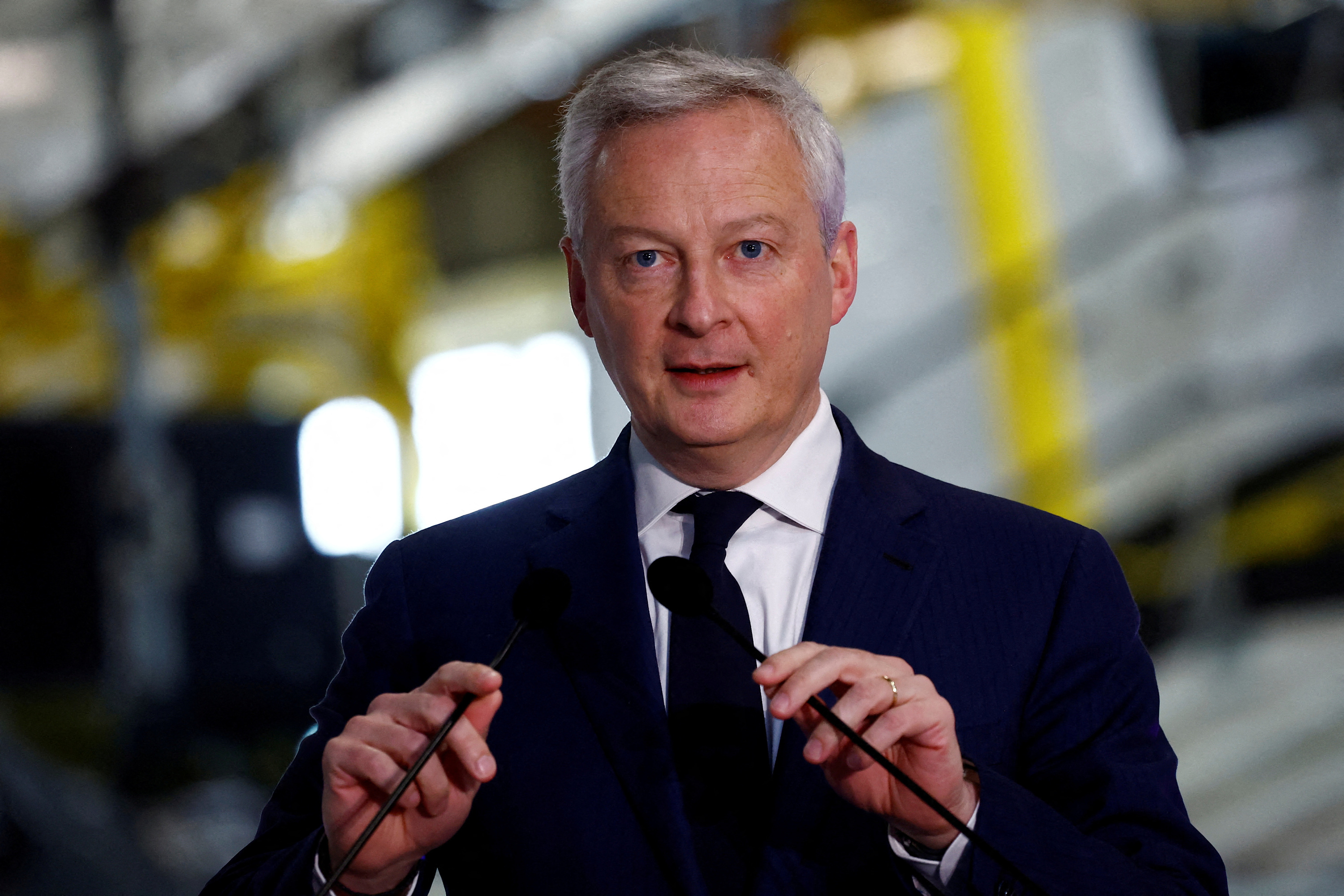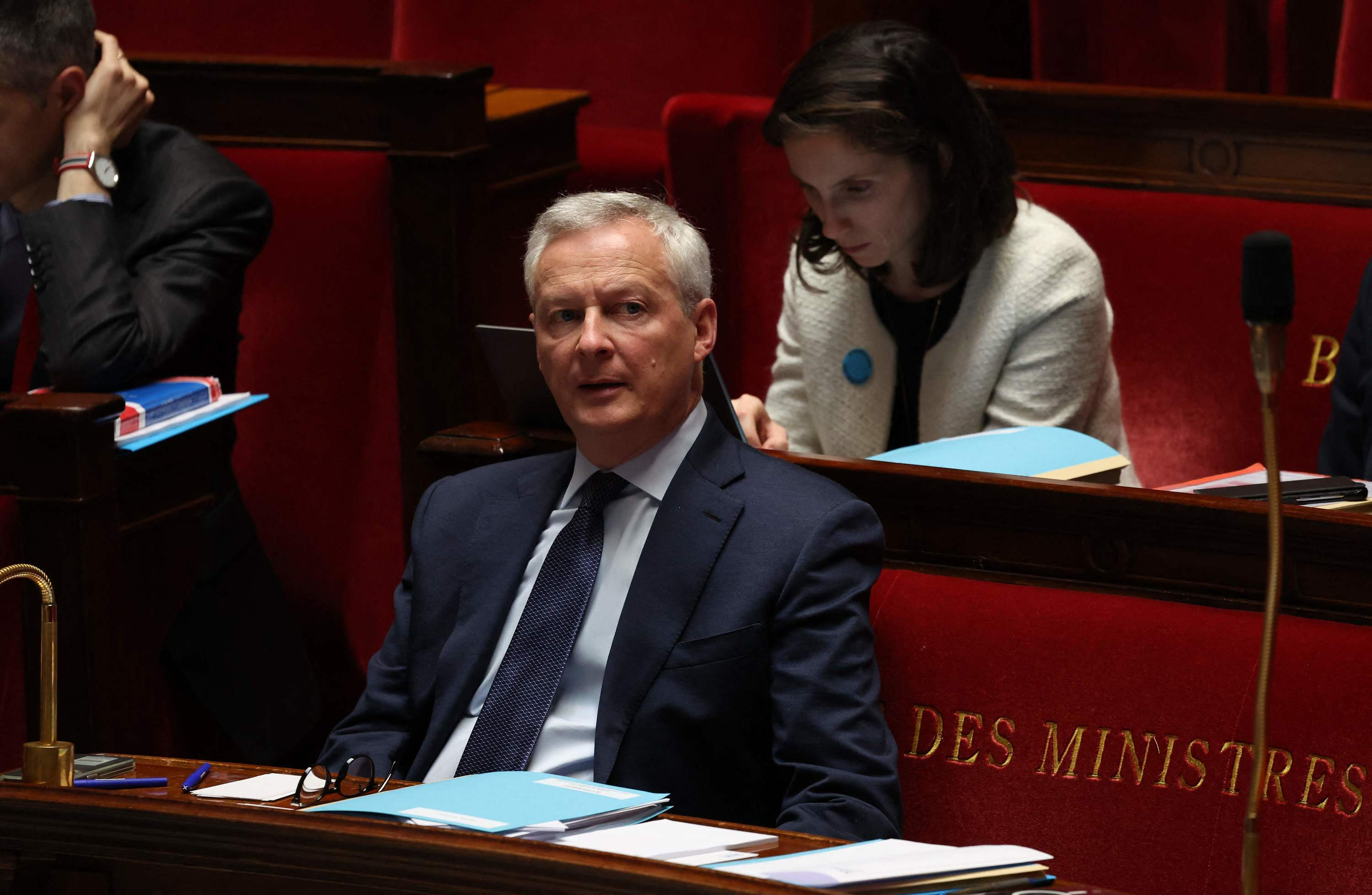On April 4, 1949, at the very beginning of the Cold War, a group of twelve European and North American states signed the North Atlantic Treaty in Washington. After its entry into force on August 24 of the same year, a multilateral political-military alliance was thus established, with the objective of ensuring the collective security of member states. This Thursday, April 4, 75 years to the day after the signing, the foreign ministers of the 32 member states of the North Atlantic Treaty Organization (NATO) are meeting in Brussels for this anniversary of the founding treaty. On this occasion Jens Stoltenberg, the Secretary General of NATO, proposed on Wednesday that the Organization release an envelope of 100 billion euros over five years in order to come to the aid of Ukraine, particularly affected by the war since the Russian invasion of February 24, 2022.
Today it seems a long way from the time when the President of the Republic, Emmanuel Macron, said in an interview with the weekly The Economist in November 2019: “What we are experiencing is brain death. of NATO. However, NATO seems stronger today than it has ever been: the recent accessions of Finland and then Sweden, historically non-aligned, were decided in reaction to Russian aggression against Ukraine, which allowed the Organization to extend its security to the North and further enclose its impetuous Russian neighbor.
In 75 years, NATO has gone from a defensive politico-military agreement made up of 12 Western states to an alliance which today brings together around the United States the overwhelming majority of the European continent as well as Canada, for a total from 32 states. On this anniversary date, Le Figaro retraces the successive enlargements of the North Atlantic Treaty Organization.
While the Soviets blockaded the city of Berlin, in a Cold War that was just beginning, the North Atlantic Treaty Organization was originally formed in 1949 by twelve founding members: Belgium, Canada , Denmark, the United States, France, Iceland, Italy, Luxembourg, Norway, the Netherlands, Portugal and the United Kingdom. The most significant link between these states is embodied in Article 5 of the Washington Treaty, which states that "if a NATO country is the victim of an armed attack, each member of the Alliance will consider this act of violence as an armed attack directed against all members and will take the measures it deems necessary to come to the aid of the country attacked. For the moment, Europe is gradually polarizing: on one side, the Western bloc, gathered around the United States in the recent NATO; on the other, the Eastern bloc, united behind the Soviet Union which does not yet rely on a similar military alliance.
In the decade that followed, in 1952, NATO expanded to include Greece, then anti-communist, and Turkey. Three years later, West Germany joined the transatlantic alliance, while German territory had been split in two since May 1949, between the Federal Republic of Germany (FRG) to the west of the Iron Curtain and the German Democratic Republic (GDR) on the east side. It was precisely in this context that the Warsaw Pact was founded in May 1955. A strategic military alliance bringing together the states of Eastern Europe (People's Republic of Albania, German Democratic Republic, People's Republic of Bulgaria, Republic People's Republic of Hungary, People's Republic of Poland, Romanian People's Republic, Czechoslovak Republic) and the USSR, this agreement acts as a response to NATO influence.
Then, almost three decades passed before a new member joined the Alliance: the young Spanish democracy, freed from the dictatorial yoke of General Franco, signed the treaty at the end of May 1982.
In the late 1980s, Mikhail Gorbachev (general secretary of the Central Committee of the Communist Party of the Soviet Union from 1985 to 1991) launched perestroika ("reconstruction", in French) and glasnost ("transparency", in French) , domestic policies which advocated greater economic and social freedom as well as an expansion of freedom of expression, which tended to reduce the totalitarian dimension of Soviet power. It is in this context that after the fall of the Berlin Wall in 1989, reunified Germany, having extended the federal republic to its entire territory, decided to remain a member of NATO.
In July 1991, while the dislocation of the USSR was almost complete, the Warsaw Pact was dissolved. The disappearance of its eastern equivalent is forcing NATO to reinvent itself. In the decade that opens, new objectives are assigned to it: peacekeeping in the Balkans, war against terrorism, cybersecurity, etc. Also, the decision was made to expand the alliance towards Eastern Europe, towards the former satellites of Moscow, barely freed from the authority of communist Russia and in search of economic and political opening. .
A first eastern enlargement took place in March 1999, allowing Poland, Hungary and the Czech Republic to become members of the Atlantic Alliance. The second extension of the turn of the millennium took place in March 2004. The latter authorized the accession of Bulgaria, Estonia, Latvia, Lithuania, Romania, Slovakia and Slovenia to NATO. .
At the dawn of the 2010s, Albania and Croatia joined the Alliance (April 1, 2009). They are therefore present for the NATO summit in Strasbourg-Kehl, which takes place on April 3 and 4, 2009.
In 2011, NATO recognized four new official candidates: Bosnia and Herzegovina, Georgia, Macedonia and Montenegro. The latter's accession was ratified in June 2017, before that of North Macedonia, which took place in March 2020. Enlargement to Bosnia-Herzegovina and Georgia is still the subject of debate. More specifically, the Georgian case is particularly delicate given that it is one of the 15 former Soviet socialist republics of the USSR and that the small Caucasian country was already invaded by its Russian neighbor in 2008.
Against the backdrop of the war in Ukraine, Finland joined the North Atlantic Alliance a year ago, on April 4, 2023. Then, on Thursday March 7, 2024, less than a month ago, Sweden, thus putting a end two centuries of non-alignment. This final accession brings the number of members to 32 and means that, for the first time in its history, Sweden is currently participating in a NATO meeting as a full ally and not as a guest country. In addition, the arrival of the last two members contributes to strengthening the Alliance by significantly stretching its geographical borders to the gates of Russia.
After three quarters of a century, NATO has never been so extensive, but a shadow still hangs over the future of the Atlantic alliance with the possible victory of the Republican candidate and former president of the United States in the American presidential election next November. Donald Trump, who had already sharply criticized the defense organization during his mandate, announced that he would encourage Russia to do "whatever it wants" to a NATO member country if the latter did not respect his obligations in terms of military spending, according to the words of the person concerned, held during a campaign meeting last February. This declaration constituted for the first time a questioning of the principle of the Atlantic Alliance, which guarantees by article 5 of its charter that a member attacked by a third country is defended militarily by the other States which have signed the founding treaty. The former Republican president closed his speech with a threatening injunction: “You must pay.”

 What is chloropicrin, the chemical agent that Washington accuses Moscow of using in Ukraine?
What is chloropicrin, the chemical agent that Washington accuses Moscow of using in Ukraine? Poland, big winner of European enlargement
Poland, big winner of European enlargement In Israel, step-by-step negotiations for a ceasefire in the Gaza Strip
In Israel, step-by-step negotiations for a ceasefire in the Gaza Strip BBVA ADRs fall almost 2% on Wall Street
BBVA ADRs fall almost 2% on Wall Street Sánchez cancels his agenda and considers resigning: "I need to stop and reflect"
Sánchez cancels his agenda and considers resigning: "I need to stop and reflect" The Federal Committee of the PSOE interrupts the event to take to the streets with the militants
The Federal Committee of the PSOE interrupts the event to take to the streets with the militants Repsol: "We want to lead generative AI to guarantee its benefits and avoid risks"
Repsol: "We want to lead generative AI to guarantee its benefits and avoid risks" Osteoarthritis: an innovation to improve its management
Osteoarthritis: an innovation to improve its management The yen jumps 3% then falls again, amid speculation of Japanese intervention
The yen jumps 3% then falls again, amid speculation of Japanese intervention A very busy Friday on the roads of Île-de-France before the Ascension Bridge
A very busy Friday on the roads of Île-de-France before the Ascension Bridge Fraud: the government is preparing new measures for the fall
Fraud: the government is preparing new measures for the fall Nike breaks the bank to keep the Blues jersey
Nike breaks the bank to keep the Blues jersey Madonna ends her world tour with a giant - and free - concert in Copacabana
Madonna ends her world tour with a giant - and free - concert in Copacabana Harry Potter: Daniel Radcliffe “really saddened” by his final breakup with J.K. Rowling
Harry Potter: Daniel Radcliffe “really saddened” by his final breakup with J.K. Rowling Leviathan, New York Trilogy... Five books by Paul Auster that you must have read
Leviathan, New York Trilogy... Five books by Paul Auster that you must have read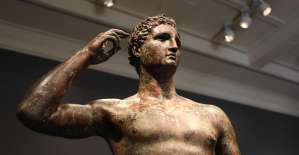 Italy wins a decisive round against an American museum for the restitution of an ancient bronze
Italy wins a decisive round against an American museum for the restitution of an ancient bronze Omoda 7, another Chinese car that could be manufactured in Spain
Omoda 7, another Chinese car that could be manufactured in Spain BYD chooses CA Auto Bank as financial partner in Spain
BYD chooses CA Auto Bank as financial partner in Spain Tesla and Baidu sign key agreement to boost development of autonomous driving
Tesla and Baidu sign key agreement to boost development of autonomous driving Skoda Kodiaq 2024: a 'beast' plug-in hybrid SUV
Skoda Kodiaq 2024: a 'beast' plug-in hybrid SUV The home mortgage firm rises 3.8% in February and the average interest moderates to 3.33%
The home mortgage firm rises 3.8% in February and the average interest moderates to 3.33% This is how housing prices have changed in Spain in the last decade
This is how housing prices have changed in Spain in the last decade The home mortgage firm drops 10% in January and interest soars to 3.46%
The home mortgage firm drops 10% in January and interest soars to 3.46% The jewel of the Rocío de Nagüeles urbanization: a dream villa in Marbella
The jewel of the Rocío de Nagüeles urbanization: a dream villa in Marbella Europeans: a senior official on the National Rally list
Europeans: a senior official on the National Rally list Blockade of Sciences Po: the right denounces a “drift”, the government charges the rebels
Blockade of Sciences Po: the right denounces a “drift”, the government charges the rebels Even on a mission for NATO, the Charles-de-Gaulle remains under French control, Lecornu responds to Mélenchon
Even on a mission for NATO, the Charles-de-Gaulle remains under French control, Lecornu responds to Mélenchon “Deadly Europe”, “economic decline”, immigration… What to remember from Emmanuel Macron’s speech at the Sorbonne
“Deadly Europe”, “economic decline”, immigration… What to remember from Emmanuel Macron’s speech at the Sorbonne These French cities that will boycott the World Cup in Qatar
These French cities that will boycott the World Cup in Qatar Mercato: Verratti at Barça? A track studied
Mercato: Verratti at Barça? A track studied Rugby: after the defeat during the Six Nations, the Blues will meet the English in September for a test match
Rugby: after the defeat during the Six Nations, the Blues will meet the English in September for a test match Premier League: Liverpool unveils its new jersey for next season
Premier League: Liverpool unveils its new jersey for next season Formula 1: Alpine holds its new executive technical director
Formula 1: Alpine holds its new executive technical director